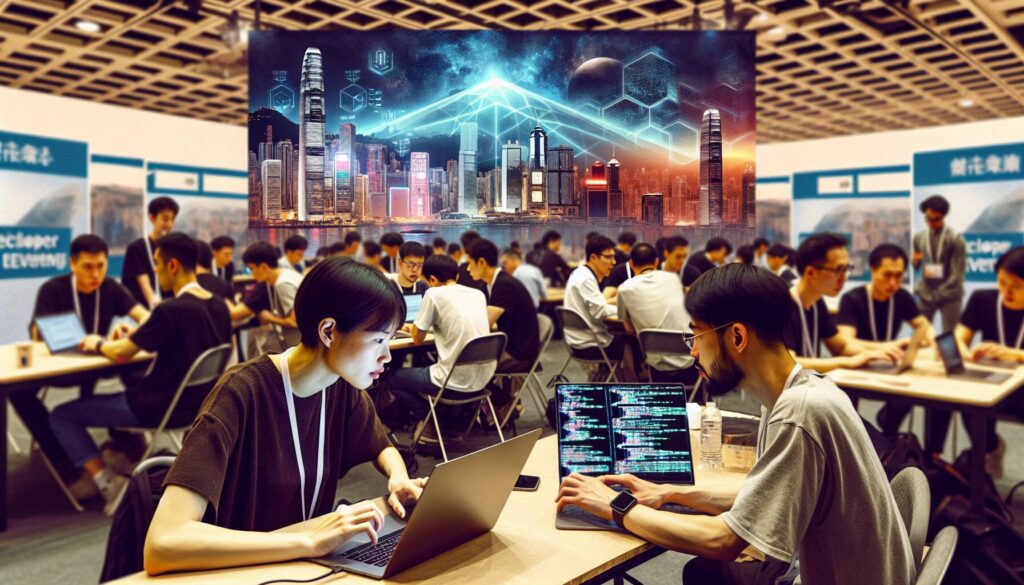The cryptocurrency industry is experiencing a significant ripple effect as the artificial intelligence (AI) and high-performance computing (HPC) sectors surge forward, propelled by major contracts and partnerships. A noteworthy development comes from OpenAI, which has established a monumental agreement to purchase tens of billions of dollars worth of chips from Advanced Micro Devices (AMD). This substantial deal is not just about hardware; it could also pave the way for OpenAI to secure up to a 10% stake in AMD over time, a prospect that has sent AMD’s shares soaring by approximately 30%, currently trading around $225.
According to recent reports from the Financial Times, the chips acquired under this agreement are expected to provide an impressive total computing power capacity of 6 gigawatts (GW), with estimates indicating that developing each gigawatt could cost around $50 billion when accounting for both the chips and the necessary supporting infrastructure. Such large-scale investments tend to ignite enthusiasm across the AI and HPC landscape, often leading to rallies in shares of companies involved in mining and infrastructure.
“In just one day, several AI and HPC-focused companies saw their stock prices rise dramatically, including Bitfarms, which gained 8%, IREN climbing 12% to hit all-time highs, and others such as Hive Digital and Cipher Mining also reporting notable increases,”
These developments are significant as they showcase the robust interconnectedness between AI advancements and the cryptocurrency sector. Additionally, Galaxy Digital (GLXY) has positioned itself as a major player in this evolving space, benefiting from the rapid changes in AI and HPC infrastructure. The firm has invested in transforming its Helios campus into a state-of-the-art AI/HPC data center and recently secured $1.4 billion in financing for this ambitious project. Following the AMD news, Galaxy Digital shares have also experienced a boost, rising 5%, contributing to a remarkable 116% increase year-to-date.

AI and HPC Industry Developments
Key points regarding the recent developments in the artificial intelligence (AI) and high-performance computing (HPC) sector:
- OpenAI and AMD Partnership:
- OpenAI has agreed to purchase tens of billions of dollars worth of chips from Advanced Micro Devices (AMD).
- Potential acquisition of a 10% stake in AMD over time.
- AMD shares surged approximately 30%, currently valued at about $225.
- Computing Power Investment:
- The agreement provides a total computing capacity of 6 gigawatts (GW).
- Estimated cost of 1 GW capacity is around $50 billion, including chips and infrastructure.
- Market Reaction:
- AI and HPC-focused miners saw significant share rallies following the announcement.
- Examples of stock increases: Bitfarms (BITF) +8%, IREN +12%, Hive Digital (HIVE) +12%, and others.
- Galaxy Digital’s Expansion:
- Converted Helios campus into a large-scale AI/HPC data center.
- Secured $1.4 billion in financing to retrofit the facility.
- Launched GalaxyOne, a wealth management platform with a 4% yield on FDIC-insured cash.
- GLXY shares increased by 5% and are up 116% year-to-date.
These developments may impact readers by highlighting investment opportunities in AI and HPC, influencing tech stock performance, and demonstrating the potential for growth in related sectors.
Competitive Analysis of OpenAI’s Recent Chip Acquisition
The ongoing wave of substantial contracts in the artificial intelligence (AI) and high-performance computing (HPC) landscape is markedly exemplified by OpenAI’s monumental agreement with Advanced Micro Devices (AMD). This partnership stands out for its potential long-term investments, further solidifying OpenAI’s foothold in the rapidly evolving tech ecosystem. With AMD’s 30% surge in stock value, this deal represents a formidable competitive advantage, particularly as it positions both companies to command greater market share amidst escalating demand for computational power.
In contrast to peers like Galaxy Digital (GLXY), which has successfully leveraged its Helios campus into a substantial AI and HPC data center, OpenAI’s integrated approach to securing substantial chip quantities and potential equity stake in AMD provides a robust foundation for enduring success. GLXY’s recent rise, attributed to its diverse portfolio and innovative product offerings such as the GalaxyOne wealth management platform, highlights how diversification can also play a pivotal role in risk management and overall growth.
However, the dependency on one primary supplier like AMD can pose a risk for OpenAI, particularly in an industry characterized by rapid technological shifts and the need for consistent innovation. Should AMD encounter production delays or experience supply chain disruptions, OpenAI might face significant operational hurdles that could hinder its broader ambitions.
The news surrounding OpenAI’s chip acquisition will likely benefit data-heavy industries and companies looking to expand their AI capabilities. Entities involved in AI-driven applications, cloud computing, and big data analytics stand to gain tremendously from enhanced processing powers. Conversely, traditional tech firms that lack the agility to adapt or pivot towards AI enhancements may find themselves at a competitive disadvantage, potentially leading to a decline in market relevance as newer entrants capitalize on advancements in HPC infrastructure.
Therefore, while the immediate economic indicators suggest a favorable outcome for OpenAI and its partners, the long-term implications of such strategic deals call for careful monitoring as the dynamics of the AI and HPC sectors continue to evolve. Staying ahead in such a competitive landscape will necessitate ongoing investment in innovation, partnerships, and adaptability.

















